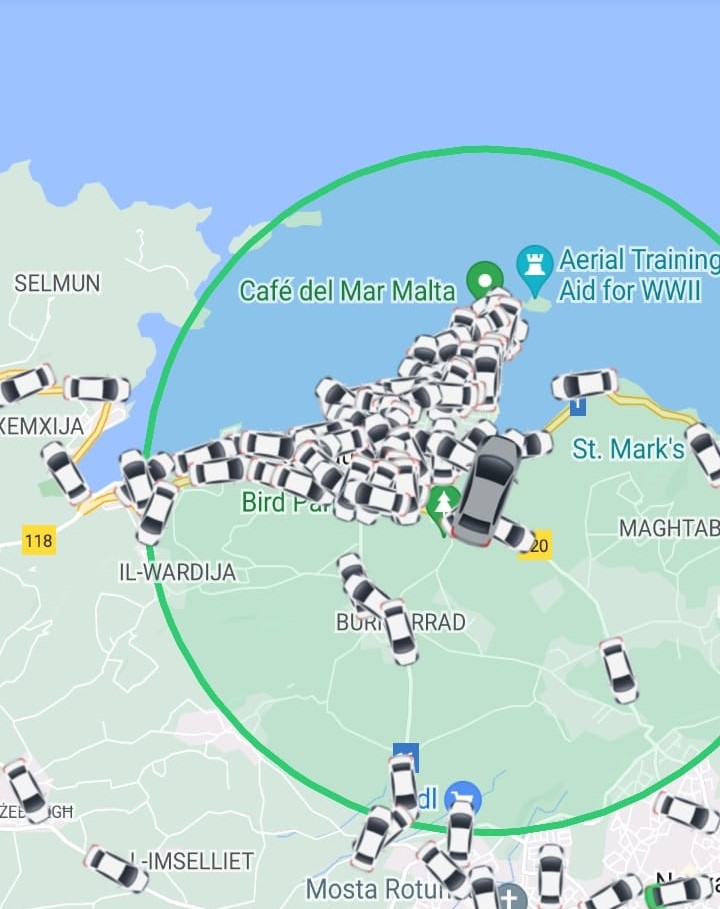Local cab drivers are finding less money in their pockets in one of the busiest years in tourism compared to the months following the COVID-19 pandemic, as a massive spike in cabs operating in Malta drove earnings down.
This newsroom has received reports from multiple drivers that, despite a record number of tourists entering Malta in 2023, the job is not as sustainable as it used to be.
A cab driver speaking on the basis of anonymity shared their thoughts with BusinessNow.mt on how the industry evolved since the pandemic started easing.
“After COVID-19 last summer, cabbing was good. Around late November it started dying down as more and more Y-plates were being issued,” they said.

According to data provided by the National Statistics Office, the number of cabs on the road shot up from 2,706 in the first quarter of 2022 to 3,919 in the first quarter of 2023, an increase of 45 per cent in a single year.
To put it into perspective, at the end of Q1 2020 there were 2,563 cabs.
While more drivers may lead to lower prices for consumers due to growing competition, it may also result in less income for drivers.
Asked whether the driver expected business to pick up in the summer season, they said, “I made more money in the winter months of 2022 than I am this summer. I sometimes worry that I may have to start to look for a full-time job again.”
They explained that there’s a large cohort of new foreign cab drivers who are using Uber-saver and Bolt economy, payment options which offer consumers the same ride at 10-20 per cent cheaper rates.
The trade off for consumers is that the ride is usually in an older car which may not in as good of a condition as regular cars, while the trade off for drivers is it's less money for the same ride.
“In order to compete, I've had to start using Bolt economy and work longer hours. Insurance costs have risen as more and more accidents are occurring.”
“I have a new €31,000 car and I am still paying for it and it has been rough. The impact of so many drivers is threatening my sense of security.”
Recently, the Government announced new rules which seek to regulate the cab industry and introduce stricter rules as to who can obtain Y-tags and Y-plates.
The rules include a requirement for all drivers without an EU driver’s licence to obtain one before they can obtain a Y-tag. Prior to this, third-country nationals were allowed to use their non-EU driver’s licence to obtain a Y-tag for a year until they obtained a driver’s licence from an EU country.
Furthermore, Y-plate holders will have to prove that they have access to a garage where they may leave their car when it is not being operated. From 23rd July, drivers will only be allowed to park Y-plate cars unattended in white parking spaces for a maximum of an hour.
"As soon as the new rules were released, I felt a weight being lifted off my shoulders," commented the driver on the new rules, saying that while they could have been introduced sooner they were a step in the right direction.
“I also believe no more Y plates should be issued until a certain amount has been scrapped. This will prevent future altercations.”
They added that there should be more enforcement on the road, both during the day and at night.
“A lot of abuse, risky driving, and behaviours such as not obeying simple stop signs are escalated, especially on weekends.”
“Topping on insurance costs should also be enforced. I'm expecting mine to be around €3,000 next year.”
They concluded, “I also hope that the drivers that are currently using international licences are stopped immediately. Many of them come from abroad, and the following day, they already have tags and driving on our streets with no experience.”
Two years since its birth, Moneybase features on Microsoft’s Customer Stories
Moneybase has now just been featured on Microsoft’s latest Customer Stories
Finance Minister confirms continuity of food and energy subsidies
Spending on food and energy subsidies as a percentage of the GDP will be at 0.7% in 2025
MHRA congratulates Glenn Micallef on EU role, highlights positive impact on Malta’s tourism and cultural sectors
The lobby group emphasised that Malta’s cultural assets and sports scene are key factors in attracting visitors and fostering economic ...






